Angels at War
Rarely, in all my years of reviewing for the HNS, have I come across such a masterly historical romance with a brilliantly set up plot. It has a touch of Catherine Cookson, but on the other side of England. The banal cover quote, ‘charming and exciting’, and even its title do the book no justice. It is very exciting in places, true; it is tragic and horrific, showing the finest human qualities as well as the basest human instincts, but it is hardly charming.
This is a far more important social record than its title or cover indicates. Angels is a department store in the suffragette years, not, as the title and cover imply, girls at war. Livia, the predictably titian-haired daughter of the rotten owner, is left with debts on her hands. Oddly in 1910 she is living with Jack, a loose ne’er-do-well, but is ambitious to resurrect the family business and denies Jack marriage. The family lawyer brings in a store manager, a tall, handsome interloper. Friction develops between Livia and Matthew, a friction which leads to both love and hate. The scene is set for an excellent, hard-to-put-down read with some deeply drawn characters, some lovable, some not, but all moving together.
The story is thick with historical accounts of suffragette meetings in 1910. Our heroine and her sister pass through poverty, prison, a hunger strike and miscarriage. While Livia is away, Jack is bedding Livia’s younger sister, Mercy. In 1914, all four go off to war to scenes of terror and death and the filthy horrors of World War I. Freda Lightfoot has the rare ability to touch the hearts with true love in the separation of war. The end, like a game of chess, is unpredictable but satisfying.










